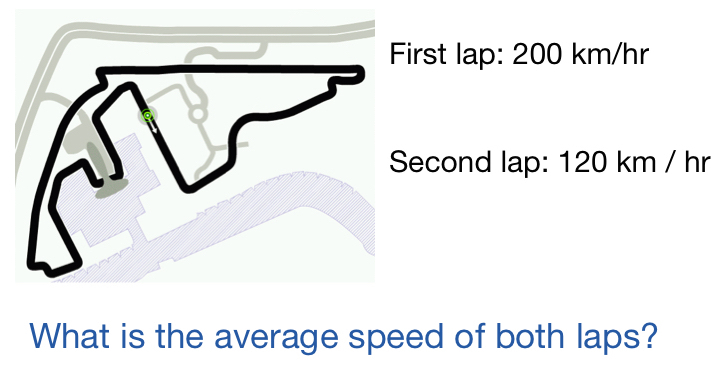Racecar Accident

In a race, the average speed of the first lap was 2 0 0 km/h , but due to an accident the average speed of the second lap was 1 2 0 km/h . What is the average speed of the two laps?
This section requires Javascript.
You are seeing this because something didn't load right. We suggest you, (a) try
refreshing the page, (b) enabling javascript if it is disabled on your browser and,
finally, (c)
loading the
non-javascript version of this page
. We're sorry about the hassle.
4 solutions
If you are finding the average you would add 200 and 120 and divide it by 2 to get 160.
Log in to reply
you are right, if the case was the time of the first lap equals the second ( t 1 = t 2 ), because v a v g = t t o t a l d t o t a l = t 1 + t 2 d 1 + d 2 = 2 × t 1 d 1 + d 2 = 2 1 ( t 1 d 1 + t 1 d 2 ) = 2 1 ( t 1 d 1 + t 2 d 2 ) = 2 1 ( v 1 + v 2 ) , but as you see since the distance of the first lap equals to the distance of the second lap and they have different speeds so they must have different times which makes the statement v a v g = 2 v 1 + v 2 invalid. and so the average speed is as @Sambhrant Sachan explained.
and generalized for n laps v a v g = v 1 1 + v 2 1 + ⋯ + v n 1 n .
Your solution, Sachan, shows two different formulas - one with 'time taken' as a denominator. However, we are not given time taken, not are we given the distance of one lap to calculate time taken per lap - it does not aid in answering the problem.
Uh Typo, it should be km/h.
SAMBHRANT is correct. Let s=the distance of one lap as we are not given that value. The time to finish the first lap is distance/ speed = s/200. Likewise the second lap thus takes s/120. The total time for both laps is the sum of the two which is (3s+5s)/600 = 2s/150.
They travelled at the slower speed for a longer period of time. So the slower speed is weighted more heavily in the average than the higher speed.
Just use the harmonic mean formula. Let a = initial speed b = second speed
Harmonic mean tells us that the average velocity is:
v a v e = ( a + b 2 a b )
Because it is talking about the average speed, we can set the distance of one lap to anything we like.
The most simple way is to set the distance to g cd ( 2 0 0 , 1 2 0 ) = 6 0 0 km (as 200 and 120 are the speeds given). We use greatest common divisor because now it is easy to calculate [time = distance divided by speed] as our two speeds are a divisor of the distance, allowing us to work with integers.
Then, using the formula time = distance divided by speed, the first lap is completed in 2 0 0 6 0 0 = 3 hours while the second lap is completed in 1 2 0 6 0 0 = 5 hours.
This means both laps are completed in 8 hours, and the distance of 2 laps are 6 0 0 × 2 = 1 2 0 0 km. Then the average speed is 8 1 2 0 0 = 1 5 0 km/h. (using the formula speed = distance divided by time)
*A race of 1200km is unlikely, but this can be any value, with the ratio of the time took for the first lap to the time took for the second lap being 3:5 which will not change.
Let the distance traveled in one lap be " s " V Avg. = Total Time taken Total Distance V Avg. = 2 0 0 s + 1 2 0 s 2 s = 1 5 0 k m / h